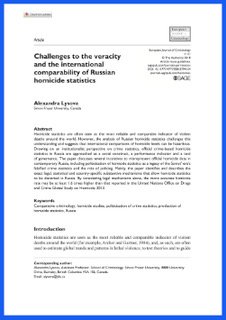By: Alexandra Lysova
Homicide statistics are often seen as the most reliable and comparable indicator of violent deaths around the world. However, the analysis of Russian homicide statistics challenges this understanding and suggests that international comparisons of homicide levels can be hazardous. Drawing on an institutionalist perspective on crime statistics, official crime-based homicide statistics in Russia are approached as a social construct, a performance indicator and a tool of governance. The paper discusses several incentives to misrepresent official homicide data in contemporary Russia, including politicization of homicide statistics as a legacy of the Soviet’ era’s falsified crime statistics and the role of policing. Mainly, the paper identifies and describes the exact legal, statistical and country-specific substantive mechanisms that allow homicide statistics to be distorted in Russia. By considering legal mechanisms alone, the more accurate homicide rate may be at least 1.6 times higher than that reported in the United Nations Office on Drugs and Crime Global Study on Homicide 2013.
European Journal of Criminology 1 –21





